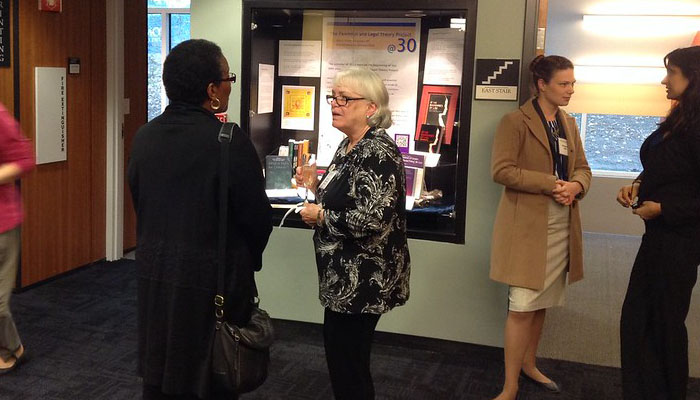Emory Law has a nationally recognized health care law program, which benefits from our proximity to Emory’s Woodruff Health Sciences Center, which includes Emory Healthcare, and the Centers for Disease Control and Prevention (CDC). Our connections provide a forum for students and scholars to address global health law and policy issues; educational and training programs; and hands-on student practicum experiences. Faculty produce scholarship in a wide range of health law fields, including access to healthcare, public health law, disability law, biotechnology, pharmaceutical pricing, and the regulation of healthcare professionals.

Studying Health Law

Students can also choose to earn their juris doctor degree with a health-law concentration. To earn the health law concentration, students must (1) be accepted into the Health Law Program through a competitive process, (2) complete a minimum of 12 credits of required and elective courses (3) and complete an additional 2-3 credits in the capstone experience requirement, including a writing project in health law or an experiential offering in health law.
Emory Law has numerous credit-bearing health law-related externships and experiential learning activities available to students, including Technological Innovation: Generating Economic Results, or the TI:GER® Program. TI:GER is a nationally recognized collaboration between Emory Law and the Georgia Institute of Technology, bringing together graduate students in law, business, science, and engineering to work on start-up projects to transform highly promising research into economically viable projects. The law school coordinates externships with organizations such as the U.S. Department of Health and Human Services (Atlanta), the U.S. Centers for Disease Control and Prevention, the Health Law Partnership, the American Cancer Society, and the Feminist Women’s Health Center, among others.
Emory Law and the Rollins School of Public Health cooperate to offer a Juris Doctor and Master of Public Health (JD/MPH) degree. A Juris Doctor and Masters of Arts in Bioethics joint degree program is offered in conjunction with Emory’s Laney Graduate School.
Health Law Faculty
Recent Faculty Scholarship
Margo A. Bagley
“Study to Identify Specific Cases of Genetic Resources and Traditional Knowledge Associated with Genetic Resources that Occur in Transboundary Situations or for Which it is not Possible to Grant or Obtain Prior Informed Consent,” Convention on Biological Diversity Secretariat (CBD) (August 2020) (with Frederick Perron-Welch)
Mary Anne Bobinski
Law and Power in Health Care: Challenges to Physician Control, 67 Buffalo L. Rev. 595 (2019)
Michael J. Broyde
Intellectual Property and Genetic Sequences: A Jewish Law Perspective in Patents on Life: Religious, Moral, and Social Justice Aspects of Biotechnology and Intellectual Property (Thomas C. Berg, Roman Cholij, Simon Ravenscroft, eds.)(Cambridge 2019).
Matthew Lawrence
Securing the Hand that Feeds: For and Against Chevron Deference in Appropriations Law, Duke L. J. (forthcoming 2021).
Health Law Practice Society
The Health Law Practice Society promotes discussion among students, faculty, and practicing attorneys about the multitude of issues that lie at the complex intersection of health and law. The Society’s featured practice areas include food and drug law, medical malpractice law, health policy, bioethics, Medicare/Medicaid law, and others. The Society is committed to educating students about the many different career opportunities available in the field through summer internship advice panels, expert speakers, and networking events.
Vulnerability and the Human Condition Initiative
Emory Law is home to the Vulnerability and Human Condition Initiative, founded by Martha Albertson Fineman, Robert W. Woodruff Professor of Law. The Vulnerability and the Human Condition Initiative has created an academic space within which scholars can imagine models of state responsibility that focus on the universal and constant vulnerability of human beings and their consequential and inevitable reliance on social relationships and institutions over the life course. These imperfect institutions and relationships are created and maintained by and through law, and, as such, their operation and effects on society should be viewed as at least partly the on-going responsibility of those who govern our societies. The Initiative and its affiliated faculty have focused considerable attention on the implications of Vulnerability Theory for bioethics, society’s response to COVID-19, and other health law-related topics.
